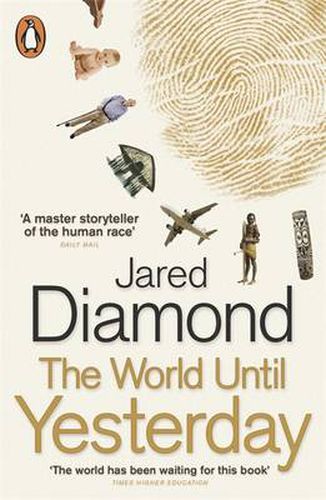The World Until Yesterday: What Can We Learn from Traditional Societies?
Jared Diamond

The World Until Yesterday: What Can We Learn from Traditional Societies?
Jared Diamond
The no. 1 bestselling author of Collapse and Guns, Germs and Steel explores the profound lessons that traditional societies offer us today.
Over the past 500 years, the West achieved global dominance, but do Westerners necessarily have better ideas about how to raise children, care for the elderly, or simply live well?
In this epic journey into our past, Jared Diamond reveals that traditional societies around the world offer an extraordinary window into how our ancestors lived for the majority of human history - until virtually yesterday, in evolutionary terms. Drawing on decades of his own fieldwork, Diamond explores how tribal people approach essential human problems, from health and diet to conflict resolution and language, and discovers they have much to teach us.
Review
Mark Rubbo
At a large airport, people might mingle, join queues and follow instructions peacefully, and it’s most likely that they won’t know anyone else around. In traditional societies, those kinds of interactions would be impossible, as strangers often represent danger.
In this amazing book, Jared Diamond examines how traditional societies differ from ours and what we may learn from each other. Political states with laws and rulers and bureaucracies have only existed for a relatively short time, and indeed it’s only recently that there have not been examples of traditional societies on the planet.
In New Guinea and parts of South America ‘first contact’ was as recent as the 1930s and there are fairly reliable accounts of how these societies were organised. Diamond does not romanticise these communities. They were often much more violent than our own, not in terms of the numbers slain or wounded but in terms of the percentages of the populations that were. In addition, intertribal conflicts were protracted affairs that could go on for years and often involved all generations and sexes. Infanticide was common, especially in hunter-gatherer societies where mothers were unable to nurse a second child if they were still nursing and carrying their previous child.
State justice too is often better in some respects than traditional justice as it codifies and objectifies a crime or misdemeanour, but traditional societies have a form of restorative justice that can lead to better outcomes for victims and perpetrators. In child rearing there are some practices that we have lost that we may like to reconsider. In traditional societies young children are continuously held and other adults have constant and active contact with the group’s children. Diamond’s examples of differences between our WEIRD (Western, educated, industrial, rich, democratic) societies and traditional ones are fascinating. What does it tell us? Well, it’s up to us to decide.
Mark Rubbo is Readings’ managing director
This item is not currently in-stock. It can be ordered online and is expected to ship in 3-5 days
Our stock data is updated periodically, and availability may change throughout the day for in-demand items. Please call the relevant shop for the most current stock information. Prices are subject to change without notice.
Sign in or become a Readings Member to add this title to a wishlist.


